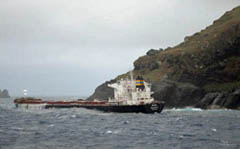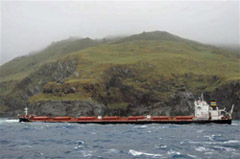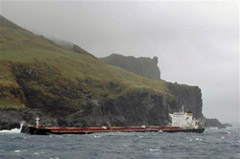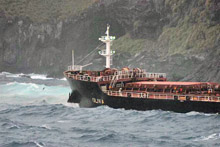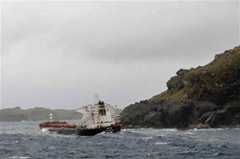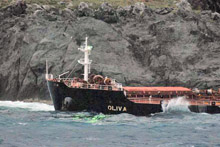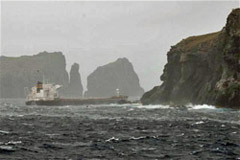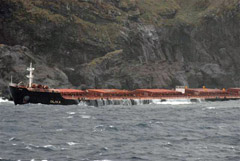The Greek-owned bulk carrier MS Oliva run aground on 4-km² Nightingale Island, part of the UK's Tristan da Cunha Islands in the South Atlantic and home to large populations of albatrosses and other seabirds, in the early morning of 16 March.
The heavily-laden 75 300-tonne ship, registered in 2009, was proceeding from Santos in Brazil to Singapore with a cargo of Soya beans. A salvage tug is to leave Cape Town today and is expected to arrive at Nightingale on the 21st.
Meanwhile members of the Tristan Conservation Department are attempting to reach the site of the shipwreck to set rodent traps on the island as a precautionary measure but are currently being hampered by rough seas. Although the ship's captain has stated it is free of rats, Nightingale is one of the few alien mammal-free islands in the Southern Ocean, and the arrival and establishment of rats would place its seabirds and land birds at severe risk.
Early this morning rough seas were also stalling the evacuation of the full complement of the ship's crew to a crayfish fishing vessel that is standing by. Waves are now starting to break over the grounded ship and the first signs of spilled oil have also been noticed: bad news especially for the island's penguins.
Nightingale supports important populations of Atlantic Yellow-nosed Albatrosses Thalassarche chlororhynchos (c. 1000 pairs, endemic to the Tristan Group) and of Sooty Albatrosses Phoebetria fusca (c. 200 pairs).
Report from Administrator Sean Burns 09.00 Friday 18th March
MS Oliva broke her back in the force of a relentless swell and the wreck of the ship's superstructure is now breaking up. Flows of oil are all around Nightingale's coast. The onshore Tristan Conservation Team of Simon Glass, Wayne Swain and Matthew Green are busy assessing damage to Nightingale's seabirds. This late summer season is crucial as all adults are flying daily from their nests to catch fish, squid etc to feed their rapidly maturing chicks. The island has no land mammals and is regarded as one of the world's most important wildlife habitats. The World Heritage Sites of Inaccessible and Gough Island may also be at risk from oil pollution.
Assessment Team
MV Edinburgh will this morning take on board an emergency assessment team which will travel to Nightingale to assess the situation for themselves. We expect a report and photographs later today. The team will be led by Administrator Sean Burns with Chief islander Ian Lavarello and include Fisheries Officer James Glass, Search and Rescue Police Inspector Conrad Glass, Conservation Officer Trevor Glass.
Salvage Tug's long journey
Meanwhile the salvage tug John Ross left Cape Town on 17th March with a salvage team, a naval architect, divers and an environmental advisor and equipment to treat oiled birds aboard. The ship is not likely to arrive until Monday 21st March.
Oil slick around island, birds, penguins in risk
A large oil slick from the ruptured fuel tanks of the Oliva covered the northwestern portion of the island yesterday afternoon. The ship is carrying more than 300,000 gallons of heavy marine oil and 15,000 gallons of diesel oil. We received word this morning that the MV Oliva broke in half overnight and that oil is now engulfing Nightengale Island and officials are gravely concerned about wildlife impacts.
The Tristan island group is home to the Northern Rockhopper penguin. It is endemic to these islands — i.e., it is not found anywhere else in the world. Penguins were observed ashore yesterday. It is near the end of molting season, and once molting is completed, penguins will quickly take to the sea to feed. The islands are also home to the largest concentration of Great Shearwaters in the world, estimated at 3 million. Approximately 2 million of this population nest on Nightingale Island. Other species of concern include broad-billed prions, Atlantic yellow-nosed albatross, white-bellied storm petrels, sooty albatross and the speckled petrel. The latter is endangered with only 10,000 breeding pairs remaining. They breed only on the adjacent Inaccessible Island.
There are unconfirmed reports of oiled penguins today. We hope to be in touch with local conservation officials this afternoon. Because the Tristan island group is so remote our ability to assist is limited. Our ship is not equipped with supplies nor space for wildlife rehabilitation. Because of large swell, deployment of booms, even if available, would likely be ineffective. We are reaching out to colleagues in South Africa and elsewhere to see what sort of effort might be mobilized, but time is of the essence. I’ll provide additional updates as available.
